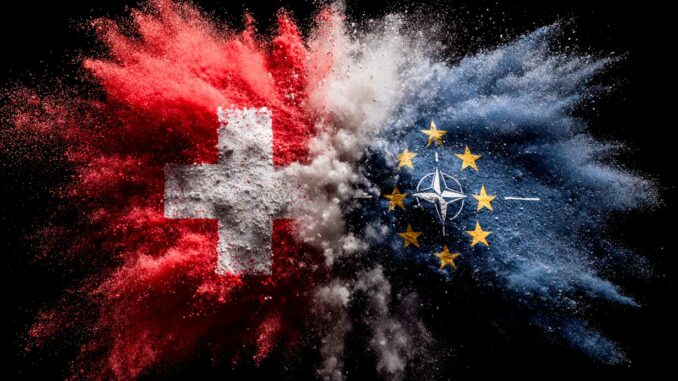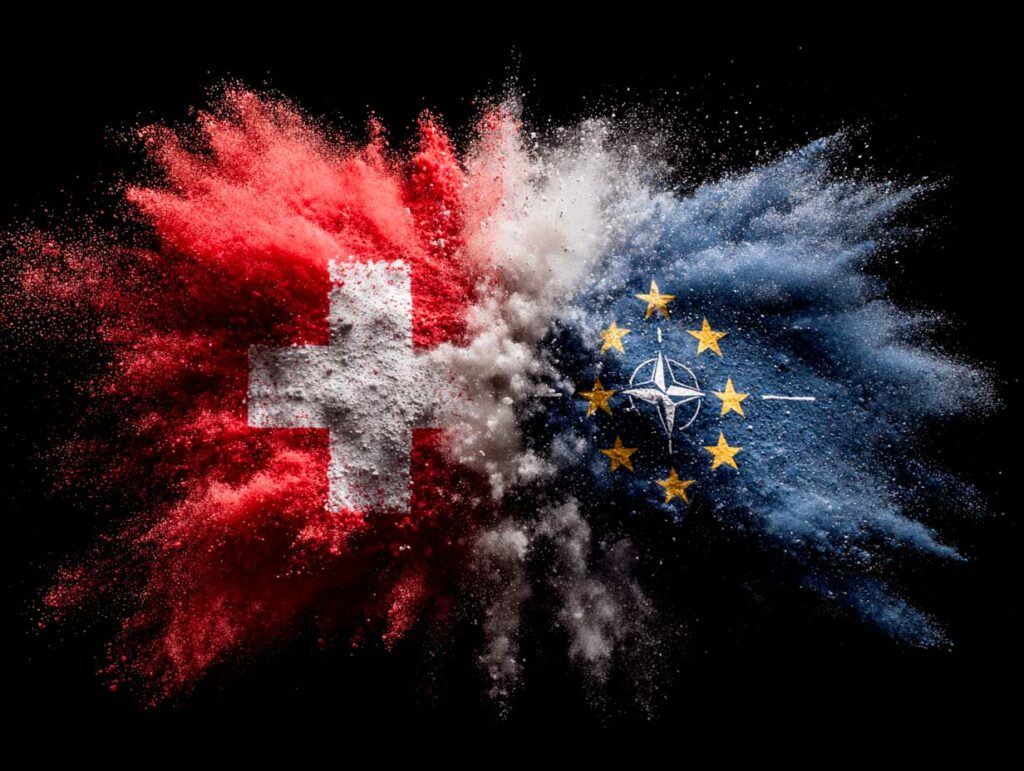
Swiss neutrality, long considered a pillar of its stability, is now being called into question by the war in Ukraine, tensions between NATO and Russia, and arms procurement decisions.
In summary
Swiss neutrality has been a founding principle of the country’s foreign policy since the 19th century. It enabled the Confederation to survive two world wars and remain outside the blocs during the Cold War. But the current environment is challenging this model. Switzerland is applying sanctions against Russia, cooperating with NATO in certain exercises, and has ordered 36 American F-35As to modernize its air force. These choices are fueling an intense debate: can we still talk about strict neutrality when security decisions are bringing Bern closer to Western standards? Between maintaining a symbol of identity and adapting to a changing Europe, Switzerland faces a delicate equation in which its economic interests, security, and diplomatic credibility intersect.
A historic concept at the heart of national identity
Swiss neutrality was enshrined at the Congress of Vienna in 1815. It is based on a commitment not to participate in armed conflicts between states and not to join permanent military alliances. During the world wars, this stance enabled Switzerland to preserve its sovereignty while maintaining a rapidly mobilizable deterrent army.
Neutrality is enshrined in the Constitution and regularly reiterated by the Federal Council. It is seen as a factor of national cohesion in a multilingual and multicultural country. Switzerland’s image as a mediator and host to international organizations stems directly from this strategic choice.
Pragmatic neutrality during the Cold War
During the Cold War, Switzerland stayed out of both NATO and the Warsaw Pact. Nevertheless, it strengthened its armed forces: in the 1980s, the country devoted more than 2.5% of its GDP to defense, with a conscription system and a militia army capable of mobilizing several hundred thousand men.
This neutrality did not preclude discreet technical cooperation with certain Western countries. Switzerland equipped itself with modern American and European weapons: Mirage III and then F-5 Tiger II aircraft, and ground-to-air defense systems. Already, a distinction was being made between political neutrality and technological dependence on Western suppliers.
Neutrality put to the test by Ukraine
The war in Ukraine has profoundly shaken Switzerland’s position. In 2022, the Swiss government adopted most of the European sanctions against Russia: asset freezes, financial restrictions, and trade limitations. However, participating in coordinated sanctions means taking a stand, which undermines the idea of absolute neutrality.
At the same time, Switzerland refused to re-export ammunition manufactured on its soil and delivered to Germany or Denmark to Ukraine. This episode illustrates the contradictions in its policy: protecting its strict legal framework while facing increasing pressure from its European partners.
Growing participation in multinational exercises
Switzerland is not a member of NATO, but has participated in the Partnership for Peace program since 1996. It takes part in multinational exercises, particularly in the field of aviation. Its F/A-18 Hornet pilots train regularly with allied forces to improve interoperability.
In 2023, the Swiss Armed Forces took part in Air Defender 23, one of the largest air exercises organized in Europe under German coordination. The presence of Swiss aircraft in this context demonstrates a pragmatic alignment with NATO standards. This does not mean joining a military alliance, but reflects operational realism: in the event of a major crisis, Switzerland could not remain isolated.

A defining choice: the purchase of 36 F-35As
The decision to purchase 36 F-35A Lightning II aircraft for an estimated cost of CHF 6 billion (approximately €6.2 billion) is a major turning point. This stealth aircraft, developed by Lockheed Martin, is designed to operate in networked combat architectures typical of NATO forces.
The purchase of the F-35 therefore raises the question: can Switzerland remain neutral while adopting an aircraft that is deeply integrated into US and allied systems? The Swiss authorities justify this choice on the basis of performance and life-cycle cost arguments, but the political signal is strong. The fleet will replace the F/A-18 Hornet and F-5 Tiger II, ensuring the sovereignty of national airspace. However, it also reinforces dependence on the United States for maintenance, software updates, and associated weaponry.
A changing regional environment
Switzerland is landlocked in the heart of a Europe that has been strengthening its military capabilities since the invasion of Ukraine. Germany has launched a special €100 billion fund, Poland plans to reach 4% of its GDP in defense spending, and France is investing €413 billion over 2024-2030 in its armed forces.
In this context, Switzerland’s neutral stance appears increasingly difficult to maintain. In the event of a major conflict on the continent, its airspace and critical infrastructure (rail networks, Alpine tunnels, financial centers) would be of strategic importance. The pressure to cooperate more closely would then be considerable.
Economic neutrality under strain
Neutrality is not just a military issue. Switzerland is a key player in the financial markets. The freezing of Russian assets, estimated at more than 7 billion Swiss francs, has shown that economic neutrality has become illusory. Its role as an international financial center obliges the Swiss Confederation to align itself with Western standards, otherwise it would risk political and economic isolation.
The choices made regarding arms exports also illustrate this tension. Swiss companies produce components that are integrated into European supply chains, particularly for armored vehicles and weapons systems. The refusal to deliver certain components to countries supporting Ukraine has sparked an internal debate on the compatibility of strict neutrality with European solidarity.
A lively internal political debate
Neutrality remains very popular in Switzerland. According to a 2024 poll, more than 90% of citizens consider it important for the country’s future. But the interpretation of this principle is divisive. Some politicians advocate “cooperative neutrality,” allowing participation in international missions and alignment with certain sanctions. Others defend a strict interpretation, limiting any involvement in global tensions.
The debate is also institutional: the Federal Council insists on the flexibility of the concept, while some parties are calling for a constitutional revision to adapt it to the realities of the 21st century.
Arguments in favor of strict adherence
For proponents of strict neutrality, abandoning this stance would be a strategic mistake. Switzerland would risk losing its role as an international mediator, embodied by Geneva and its UN organizations. It would also expose itself to economic reprisals if it aligned itself too openly with one bloc. Finally, greater military integration would entail budgetary costs and political constraints that are considered incompatible with Swiss tradition.
Arguments for gradual adaptation
Conversely, proponents of change believe that absolute neutrality is no longer tenable in a globalized world. Collective security in Europe requires greater cooperation. The purchase of F-35s, participation in joint exercises, and the application of sanctions already show that Switzerland is moving away from strict neutrality. Adapting the concept would allow it to preserve its credibility while protecting its strategic interests.
A delicate equation for the future
Switzerland faces a complex equation: preserving its identity while adapting to a changing Europe. Neutrality remains a hallmark, but its implementation is becoming increasingly pragmatic and selective. The choices made today—adoption of the F-35, increased participation in multinational exercises, economic sanctions—already show a shift.
The future will tell whether this model can withstand the geopolitical shocks to come. But one thing is certain: Swiss neutrality can no longer be defined as passive isolation. It will have to be rethought as an active, flexible strategy, adapted to a continent that is rediscovering the centrality of the military factor.
War Wings Daily is an independant magazine.